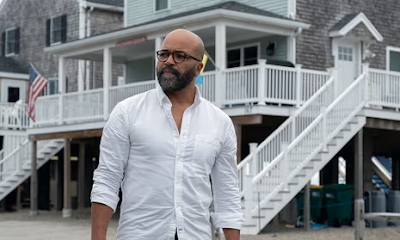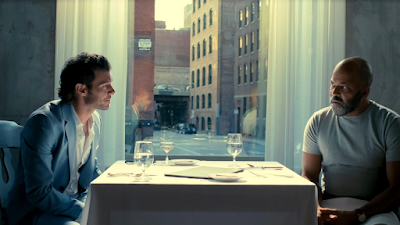Thursday, January 25, 2024
American Truth
There are moments when various forms of media feel like they're speaking directly to you. The characters react the way that you'd react and the storyline follows something that's, to one degree or another, intimately familiar to you. That was the reaction that I had when watching American Fiction. It's not just that the main character Thelonious "Monk" Ellison (an excellent Jeffrey Wright) is a writer who can't seem to find his audience (been there, my whole life) or that the material that's produced around him seems like it's just serving the base interests of the public [waves hand in general direction of world] or that he thinks he knows better about what's actually worthwhile (ahem.) It's also that those perspectives make him feel separated from much of the world at large. That's an instinct that I've worked hard to curb in the last 15 years of my life, having recognized that you can't tell people what to like, so I think I'm a bit more social and a bit less judgmental than Monk is as presented in this story. But, man, did that story sing to me.
Monk is a novelist and instructor at a small college in California who objects to the success of the fiction written by African-Americans and lauded by White reviewers and publishers as emblematic of the "Black experience." To Monk, the Black experience is the American experience and he finds no value in feeding the preconceptions of the White audience, whether sympathetic or otherwise, with material like a competitor's "We's Lives in the Ghetto." Monk is in what is often referred to as "literary fiction" (which, y'know, excludes any of that petty "genre" stuff) but his work is so elevated that it ends up getting classified as Afro-American studies in local bookstores. When he gets encouraged to take a leave of absence and go visit his dysfunctional family (which he largely detests and avoids) in Boston, he begins running headlong into those antisocial tendencies and begins to discover the people he dismisses as beneath him as having intelligent opinions and perspectives of their own which inform their own "Black experience" that happens to be quite different from his.
From the very beginning, the characters felt genuine, which is always a key aspect of any film to me. If I'm watching roles that feel like they were solely aimed to push the message, rather than be real people who incidentally drove the theme of the film, I'm generally going to feel cheated (see: Don't Look Up and Leave the World Behind as pristine examples.) Even the side characters that are clearly there to be foils for Monk feel like they have the reactions of real people that are wholly believable (White angst and guilt, artificial salesmanship, etc.) Lorraine (Myra Lucretia Taylor), Monk's mother's housekeeper, is one of his grounding points in the general goodness of humanity. Despite all of the "family melodrama" (as Monk refers to it) surrounding his circumstances in Boston, when she decides to get married, it's a sign that life keeps proceeding, no matter how much you may think the world revolves around you and your problems. Those problems include his mother, Agnes (Leslie Uggams), losing her awareness of the surrounding world, but never quite losing awareness of what makes her children, especially Monk, special.
Part of that specialness is Wright, who is perfectly cast in the role. I can't think of another actor who could have presented the frustration, weariness, and biting intelligence of the character better than he did. It's appropriate that Percival Everett, who wrote the book Erasure, that the film is based upon chose the last name "Ellison" for the main character and his family based on other people that also bore that name: Harlan Ellison, famously caustic SF writer and essayist; Ralph Ellison, who wrote about social issues faced by Black people in America; and Sheila Ellison, who writes about parenting and familial relationships. All of those elements inhabit this character and the circumstances he's forced to confront and Wright excels at presenting a typically human reaction to them, while still driven by who and what the character is. He's nicely counterbalanced by his sister, Lisa (Tracee Ellis Ross), his brother Cliff (Sterling K. Brown), and the neighbor across the street, Coraline (Erika Alexander); all of whom present different perspectives on those circumstances, but also on their approach in trying to connect with Monk who, as with many driven people, often instinctively distrusts their attempts to do so (um... yeah.) There's a great moment when Agnes, fading in and out of awareness, mentions that she thinks the reason Monk is so miserable most of the time is that "Geniuses are lonely because they can't connect with the rest of us." I'm not going to be so arrogant as to label myself a "genius", but I've certainly felt that distance where most people just don't seem to see what I do.
Also, I absolutely loved the way they handled the ending. The alternate approaches not only mirror the difficulty of the writing process, but also showed just how people will often react to the conclusion of a story they're being told and whether they'll feel that it's appropriate (Hollywood happy ending!) or closer to reality (the final choice, which had me doubled over in laughter) or simply indeterminate; a lot like life ends up. That difference in perspective suffuses the film, especially in one key exchange between Monk and that rival, successful writer, Sintara Golden (Issa Rae.) When he bemoans the fact that the public and publishers "... aren't acknowledging our potential!", Sintara replies that "Potential is what people see when what's in front of them isn't good enough." It's a salient point about perspective, but it doesn't apply to this film, as it's more than good enough. It's the best thing I've seen this (Oscar) year.
Subscribe to:
Posts (Atom)




